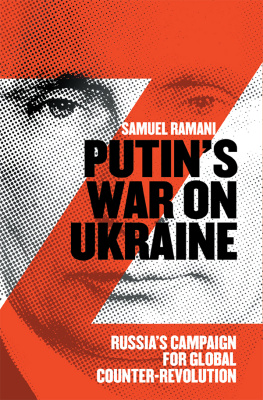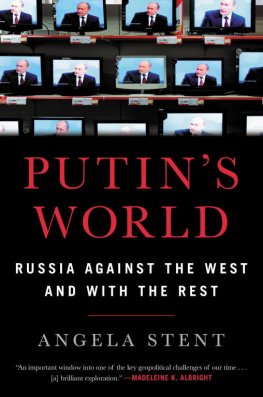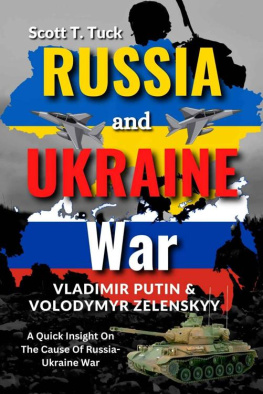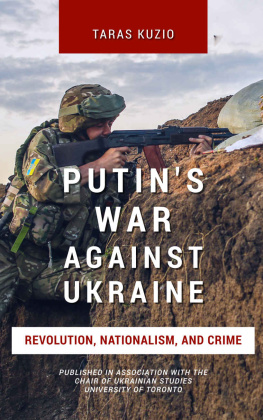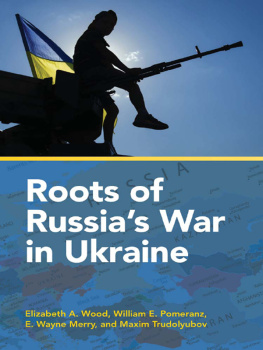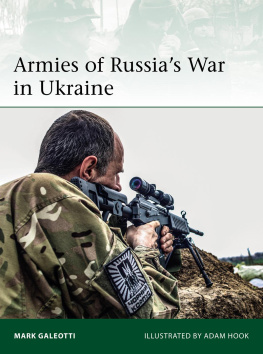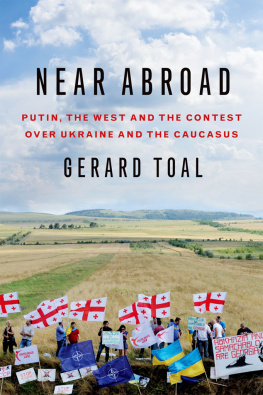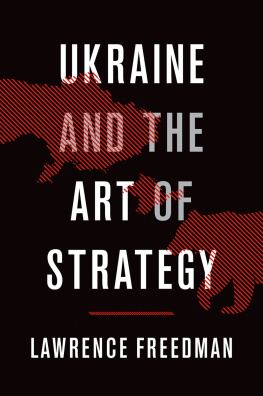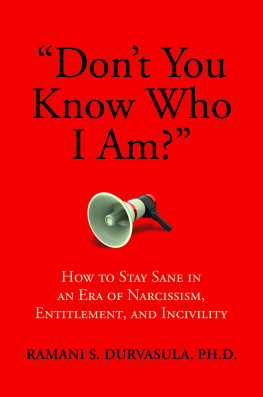Samuel Ramani - Putin’s War on Ukraine: Russias Campaign for Global Counter-Revolution
Here you can read online Samuel Ramani - Putin’s War on Ukraine: Russias Campaign for Global Counter-Revolution full text of the book (entire story) in english for free. Download pdf and epub, get meaning, cover and reviews about this ebook. year: 2023, publisher: C. Hurst & Co. (Publishers) Ltd, genre: Politics. Description of the work, (preface) as well as reviews are available. Best literature library LitArk.com created for fans of good reading and offers a wide selection of genres:
Romance novel
Science fiction
Adventure
Detective
Science
History
Home and family
Prose
Art
Politics
Computer
Non-fiction
Religion
Business
Children
Humor
Choose a favorite category and find really read worthwhile books. Enjoy immersion in the world of imagination, feel the emotions of the characters or learn something new for yourself, make an fascinating discovery.
- Book:Putin’s War on Ukraine: Russias Campaign for Global Counter-Revolution
- Author:
- Publisher:C. Hurst & Co. (Publishers) Ltd
- Genre:
- Year:2023
- Rating:3 / 5
- Favourites:Add to favourites
- Your mark:
- 60
- 1
- 2
- 3
- 4
- 5
Putin’s War on Ukraine: Russias Campaign for Global Counter-Revolution: summary, description and annotation
We offer to read an annotation, description, summary or preface (depends on what the author of the book "Putin’s War on Ukraine: Russias Campaign for Global Counter-Revolution" wrote himself). If you haven't found the necessary information about the book — write in the comments, we will try to find it.
Samuel Ramani: author's other books
Who wrote Putin’s War on Ukraine: Russias Campaign for Global Counter-Revolution? Find out the surname, the name of the author of the book and a list of all author's works by series.
Putin’s War on Ukraine: Russias Campaign for Global Counter-Revolution — read online for free the complete book (whole text) full work
Below is the text of the book, divided by pages. System saving the place of the last page read, allows you to conveniently read the book "Putin’s War on Ukraine: Russias Campaign for Global Counter-Revolution" online for free, without having to search again every time where you left off. Put a bookmark, and you can go to the page where you finished reading at any time.
Font size:
Interval:
Bookmark:

PUTINS WAR ON UKRAINE
SAMUEL RAMANI
Putins War on Ukraine
Russias Campaign for
Global Counter-Revolution

HURST & COMPANY, LONDON
First published in the United Kingdom in 2023 by
C. Hurst & Co. (Publishers) Ltd.,
New Wing, Somerset House, Strand, London, WC2R 1LA
Samuel Ramani, 2023
All rights reserved.
Printed in the United Kingdom
Distributed in the United States, Canada and Latin America by
Oxford University Press, 198 Madison Avenue, New York, NY 10016,
United States of America.
The right of Samuel Ramani to be identified as the author of this publication is asserted by him in accordance with the Copyright, Designs and Patents Act, 1988.
A Cataloguing-in-Publication data record for this book is available from the British Library.
ISBN: 9781787388512
This book is printed using paper from registered sustainable and managed sources.
www.hurstpublishers.com
CONTENTS
PUTINS WAR ON UKRAINE
AN OPPORTUNISTIC
COUNTER-REVOLUTIONARY GAMBIT
On 24 February 2022, Russian president Vladimir Putin announced the start of a special military operation aimed at the demilitarisation and denazification of Ukraine.invasion, Russias military successes were confined to Luhansk, Mariupol, and parts of Kherson and Zaporizhzhia, and its regime change ambitions in Kyiv were decisively thwarted. Moreover, the imposition of sweeping Western sanctions on Russia had imperilled its great power status aspirations and encouraged Putin to embrace increasingly totalitarian and isolationist tactics to maintain his hold on power.
This book will examine Putins decision to invade Ukraine and the implications of the Ukraine War for Russias political future and long-term geopolitical influence. Throughout its duration, it will seek to address three crucial questions: Why did Russia opt for a sweeping regime change mission instead of a far less risky and more eminently achievable Donbas offensive? How did Vladimir Putins regime survive the combined headwinds of sanctions, military setbacks and war fatigue? And what will Russias post-Ukraine War political system and foreign policy look like? By proposing answers to these questions, this book will ascertain whether Russias invasion of Ukraine is a one-off gambit driven by Putins ambitions, insecurities and world view, or the starting point for an increasingly brazenly revisionist Russian foreign policy. As the Ukraine War has increased the risk of a direct RussiaNATO confrontation and a third world war, examining the sources and implications of Russias invasion of Ukraine is critically important for academics and policymakers. This chapter will provide a perfunctory layout of this books principal hypotheses and approaches to its three defining questions, which will provide context for its in-depth examination of the Ukraine War and Russias future as a great power.
Explaining Russias Decision to Carry Out a Full-Scale Invasion of Ukraine
Although a full-scale Russian invasion of Ukraine was a scenario that was widely discussed after Russias February 2014 annexation constituted Moscows first overt regime change mission since the 1968 Soviet invasion of Czechoslovakia.
Russias official justifications for invading Ukraine do not withstand empirical scrutiny and provide little context for the scale of the current war. Putins claims that Ukraine was anti-Russia, that it had been placed under full external control, intensively settled by the armed forces of NATO countries and supplied with the most modern weapons, were similarly misleading; Ukraines NATO membership aspirations stalled after the 2008 Bucharest summit and the most consequential post-2014 arms shipments to Ukraine were suited for territorial self-defence. Putins claims about the transnational threat of Ukrainian Nazism, Ukraines hosting of U.S. biological weapons laboratories and Ukraines alleged chemical and nuclear weapons programmes were also riddled with disinformation.
Due to the implausibility of Russias official justifications for war with Ukraine, two alternative explanations have circulated widely in academic, media and think tank publications. The first explanation attributes Russias aggression to rising insecurity about NATOs expansion towards its borders. This insecurity hypothesis partially aligns with Kremlin discourse but depicts NATO expansion as a long-term risk to Russias influence and security rather than the imminent threat that Putin invoked to
Despite this strident rhetoric, three factors suggest that Russia exaggerated the NATO threat emanating from Ukraine and used it as a pretext for a full-scale invasion. First, there were no discernible indications that Ukraine was moving closer to integration with NATO in the months leading up to the war. In June 2021, U.S. president Joe Biden contradicted Zelenskys assertions that Ukraine was on a definitive path to NATO accession and insisted that Ukraine needed anti-corruption reforms to obtain membership.
The second explanation is Putin-centric, as it links the Ukraine War to Putins regime insecurity and power retention ambitions. In the Western media, Putins insecurity has often been attributed to irrationality. Although Central Intelligence Agency (CIA) Director William Burns has said there is no evidence that Putin is in ill health, speculation that he has a terminal illness or is suffering psychological after-effects from the COVID-19 pandemic have created a narrative that Putins paranoia drove him to war. The outbreak of mass protests in Belarus over president Alexander Lukashenkos alleged perpetration of voter fraud in the 2020 presidential elections and unrest in Kazakhstan in January 2022 heightened Putins sensitivity to these weaknesses. As COVID-19 and sluggish economic growth prevented Putin from delivering on the domestic promises that undergirded his re-election to a fourth term in 2018, the Ukraine War could be regarded as a gambit to rally Russians around the flag. The surge in approval ratings that Putin experienced from the Crimea annexation to the 2018 pension reform protests provided a precedent for this contention.
Although Putin has leveraged military interventions to strengthen his hold on power, regime insecurity-premised explanations can be challenged by two factors. First, there was a considerable risk that Russias invasion of Ukraine would have domestic blowback, as military interventions of this scale have historically been unpopular in Russia. Frye notes that in May 2014, only 31% of Russians supported providing direct military assistance to pro-Russian separatists in Donbas, and the long-term retention of troops in Syria was popular within the security services and firms in import-competing sectors but unpopular amongst the general public. The enduring popularity of the Ukraine War might therefore be an unexpected consequence of effective state propaganda rather than an inevitability that could have been predicted beforehand.
Second, there is little evidence that Putin viewed his regime as especially insecure in early 2022. Despite a Communist Party of the Russian Federation (CPRF) challenge to the Moscow election results and the detention of a hundred protesters against electoral fraud, the September 2021 Russian State Duma elections reaffirmed the dominance of the Putin-aligned United Russia Party. This contrasted with the 2014 annexation of Crimea, which occurred at a time when Putins popularity had fallen to an all-time low and Viktor Yanukovych, a president with similar kleptocratic ambitions to Putin, had been overthrown by street protests in neighbouring Ukraine. Therefore, there was no imperative for Putin to drastically escalate repression in Russia, and the totalitarian policies implemented after the Ukraine invasion were most likely not necessary for the survival of his regime.
Next pageFont size:
Interval:
Bookmark:
Similar books «Putin’s War on Ukraine: Russias Campaign for Global Counter-Revolution»
Look at similar books to Putin’s War on Ukraine: Russias Campaign for Global Counter-Revolution. We have selected literature similar in name and meaning in the hope of providing readers with more options to find new, interesting, not yet read works.
Discussion, reviews of the book Putin’s War on Ukraine: Russias Campaign for Global Counter-Revolution and just readers' own opinions. Leave your comments, write what you think about the work, its meaning or the main characters. Specify what exactly you liked and what you didn't like, and why you think so.

